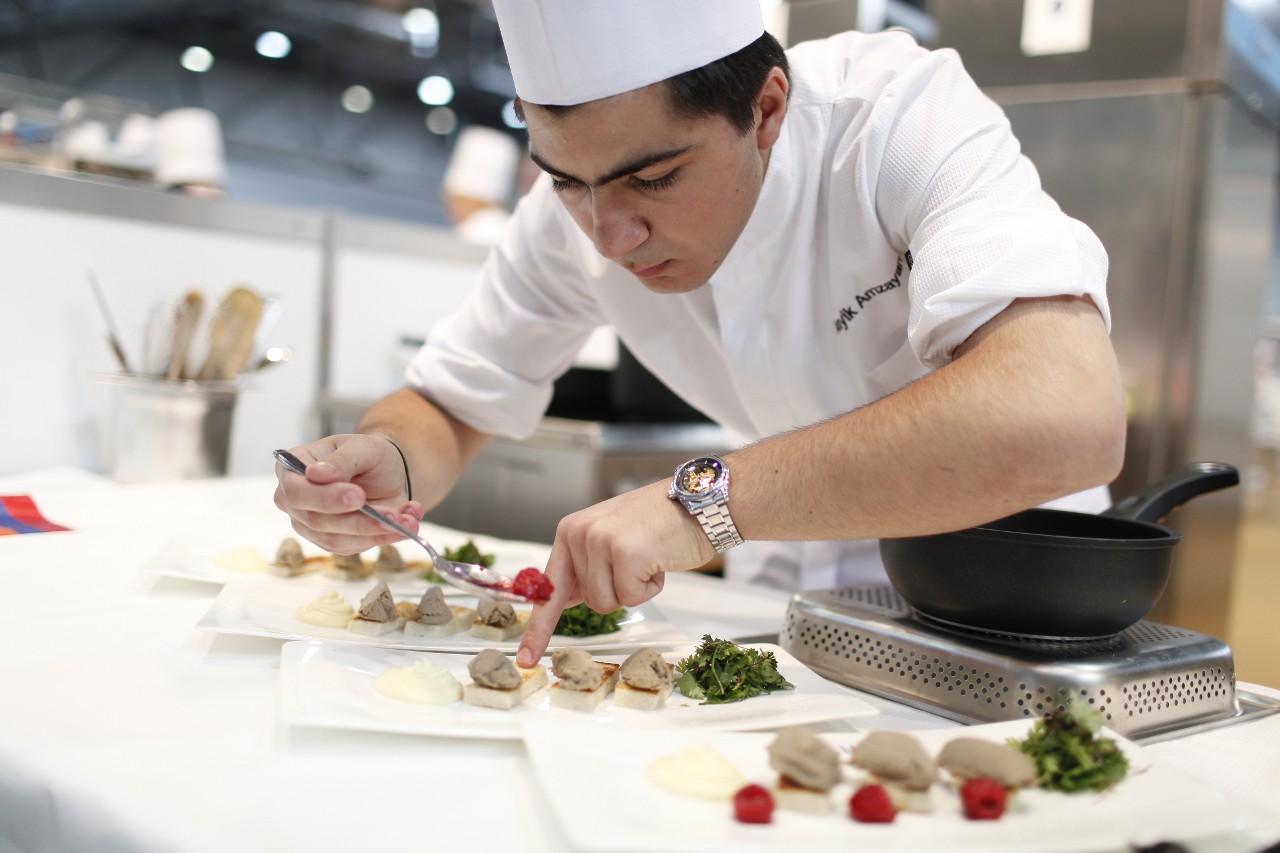Cooking 34
The professional chef can work in a wide range of establishments including high class restaurants and hotels, welfare catering such as hospitals and residential homes and industrial sites providing catering services to staff. The range of skills and customer expectations will vary according to the work-place. There is also a direct relationship between the nature and quality of the service provided and the payment made by the customer or corporate client. As well as the skill of cooking, the role of a chef will also demand further skills that relate to cooking in a commercial setting and therefore working to a budget or expected profit margin. These skills include menu compilation and costing, control and correct storage of stock, planning work for self and others and managing a kitchen brigade.
The chef in a high class hotel or restaurant offering fine dining will need to demonstrate outstanding skills in food preparation and presentation. They will be expected to create and adapt dishes that meet the expectations of demanding customers who are used to dining in exclusive restaurants. Fashions and trends in cuisine fluctuate so it is important that the top class chef keeps abreast of these trends and adapts their product and service accordingly. The customer wishing to experience fine dining is expecting a memorable meal experience which incorporates the setting and ambiance of the restaurant, restaurant theatre and outstanding customer care as well as exceptional food.
Strict maintenance of the highest personal and food hygiene and safety are paramount at all times. Failure to fulfil this requirement can have a devastating impact on diners’ health and well-being and may cause irreparable damage to the restaurant’s reputation and business.
Commercial kitchens are equipped with complex specialist equipment that must be used carefully to avoid accident and injury. Kitchens are potentially dangerous places to work. Staff work under intense pressure, often in a confined space, working with hot food and dangerous tools and equipment.
Effective communication skills are essential for the chef. A professional kitchen is a high pressure environment where teams of chefs specializing in various producing aspects of the menu work together to produce the entire meal. Co-ordination of the kitchen brigade is essential to quality assure the dishes being sent to the restaurant and to meet very tight time frames. In addition, the kitchen team need to work effectively with other departments in the hotel or restaurant to ensure a good overall experience for the guest.
With globalization of cuisine, chefs can work all over the world. Talented chefs are always in demand and have opportunities to travel and work in some of the most interesting and exciting global destinations. This carries with it the need to appreciate diverse cultures, especially with regard to dietary requirements and traditions.
Required skills
Time management, communication, work under stress, critical thinking, judgement, hygenic, endurance, to be able to work as part of a team, precision, attention to detail, punctual
Career info
The professional chef can work in a wide range of establishments, and the range of skills and customer expectations will vary according to the work-place.
As well as the skill of cooking, the role of a chef demands further skills that relate to menu compilation and costing, working to a budget or profit margin, control and storage of stock, and managing the pace and workflow of a kitchen brigade. In some settings, the kitchen team needs to work effectively with other departments both in the front and back of house to ensure a positive overall experience for guests.
The chef in a top-tier hotel or restaurant will need to demonstrate outstanding skills in food preparation and presentation. They will be expected to create and adapt dishes that meet the expectations of demanding customers (and critics!). It is important that chef keeps abreast of the trends and aware of their competition in the foodie marketplace.
Commercial kitchens are equipped with complex specialist equipment that must be used carefully to avoid accident and injury. Strict maintenance of equipment as well as personal and food hygiene and safety standards are paramount considerations and often subject to strict regulation.
With globalization of cuisine, chefs can work with talent, inspiration, ingredients, and in establishments all over the world. The pressures in this field are great, but the opportunities are nearly endless; and the potential for career advancement is ever present.
At the Competition
Competitors are judged on the preparation of international/global dishes as determined by the Test Project including:
- Cold and hot appetizers
- Egg and cheese dishes
- Stocks, hot and cold soups and sauces
- Fish and shellfish dishes
- Hot and cold dishes of meat, game and poultry
- Decoration and garnishing
- Starch and vegetable dishes
- Salads
- Hot, cold and frozen desserts
- Baked products

